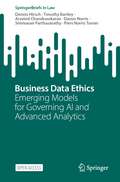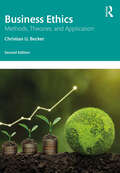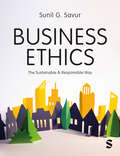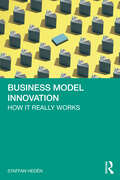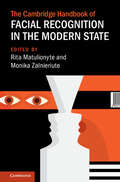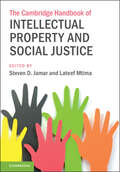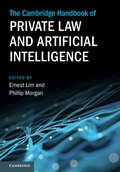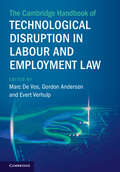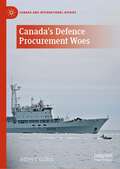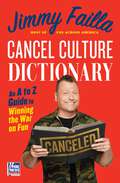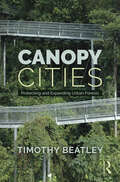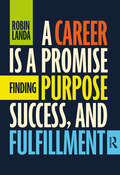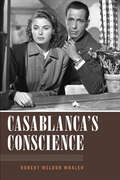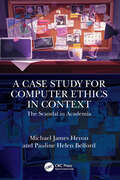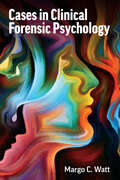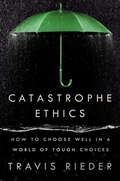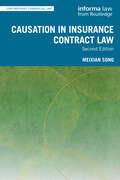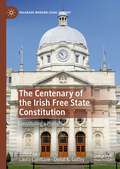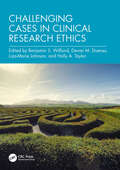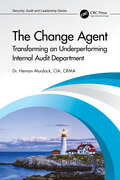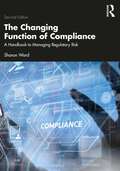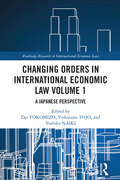- Table View
- List View
Business Data Ethics: Emerging Models for Governing AI and Advanced Analytics (SpringerBriefs in Law)
by Dennis Hirsch Timothy Bartley Aravind Chandrasekaran Davon Norris Srinivasan Parthasarathy Piers Norris TurnerThis open access book explains how leading business organizations attempt to achieve the responsible and ethical use of artificial intelligence (AI) and other advanced information technologies. These technologies can produce tremendous insights and benefits. But they can also invade privacy, perpetuate bias, and otherwise injure people and society. To use these technologies successfully, organizations need to implement them responsibly and ethically. The question is: how to do this? Data ethics management, and this book, provide some answers. The authors interviewed and surveyed data ethics managers at leading companies. They asked why these experts see data ethics as important and how they seek to achieve it. This book conveys the results of that research on a concise, accessible way. Much of the existing writing on data and AI ethics focuses either on macro-level ethical principles, or on micro-level product design and tooling. The interviews showed that companies need a third component: data ethics management. This third element consists of the management structures, processes, training and substantive benchmarks that companies use to operationalize their high-level ethical principles and to guide and hold accountable their developers. Data ethics management is the connective tissue makes ethical principles real. It is the focus of this book. This book should be of use to organizations that wish to improve their own data ethics management efforts, legislators and policymakers who hope to build on existing management practices, scholars who study beyond compliance business behavior, and members of the public who want to understand better the threats that AI poses and how to reduce them.
Business Ethics: Methods, Theories, and Application
by Christian U. BeckerBusiness Ethics: Methods, Theories, and Application provides a new systematic approach to normative business ethics that covers the complex and various ethical challenges of modern business. It aims to train analytical thinking skills in the field of business ethics and to approach ethical issues in business in a rational and systematic way.The book develops a number of specific methods for business ethics analysis that are tailored for ethical decision-making in business and for analyzing complex ethical topics in business. The book discusses fundamental ethical questions regarding the meaning of business and the economy for the individual person, society, the environment, and people around the world.As a result, Business Ethics: Methods, Theories, and Application develops normative guidelines for business in the 21st century and its fundamental challenges and will be key reading for undergraduate, postgraduate, and MBA students of business ethics, business strategy, business and society, and related fields.This second edition is fully updated to recognize the changing nature of ethics and corporate responsibility in a globalized world and includes online support material.
Business Ethics: The Sustainable and Responsible Way
by Sunil G SavurBusiness Ethics: The Sustainable and Responsible Way provides a fresh, contemporary, and hands-on approach to business ethics, emphasizing practical skills. This practical approach is supported through a rich array of short and long case studies from across the globe, including countries such as the UK, Australia, the US, India, China, Nigeria and Ghana. Cases feature companies such as Patagonia, the Aravind Eye Clinic, Merck and LEGO and examine topics such as the gig economy, fast fashion, electric vehicles, artificial intelligence, and space exploration. Accompanying questions also encourage reflection and the skills needed to apply theory to real-life scenarios. This textbook is suitable for undergraduate and postgraduate students of business ethics, as well as those studying business and society, corporate social responsibility, sustainability, and responsible management. Online resources include PowerPoint slides and a Teaching Guide. Dr Sunil G. Savur is a Business Ethics lecturer and researcher at the University of South Australia, Adelaide.
Business Ethics: The Sustainable and Responsible Way
by Sunil G SavurBusiness Ethics: The Sustainable and Responsible Way provides a fresh, contemporary, and hands-on approach to business ethics, emphasizing practical skills. This practical approach is supported through a rich array of short and long case studies from across the globe, including countries such as the UK, Australia, the US, India, China, Nigeria and Ghana. Cases feature companies such as Patagonia, the Aravind Eye Clinic, Merck and LEGO and examine topics such as the gig economy, fast fashion, electric vehicles, artificial intelligence, and space exploration. Accompanying questions also encourage reflection and the skills needed to apply theory to real-life scenarios. This textbook is suitable for undergraduate and postgraduate students of business ethics, as well as those studying business and society, corporate social responsibility, sustainability, and responsible management. Online resources include PowerPoint slides and a Teaching Guide. Dr Sunil G. Savur is a Business Ethics lecturer and researcher at the University of South Australia, Adelaide.
Business Model Innovation: How it really works
by Staffan HedénBased on the author’s 30 years of consulting experience and validated by doctoral research, this book focuses on creating profitable growth with business model innovation in medium and large companies. Arising from an increased need for systems thinking and technological development, there is a common understanding that a business model should primarily create, develop, and retain value for companies' customers. But increased globalization and resource constraints have led to a difficult balancing act when addressing the challenges of achieving profitable processes and long-term growth. This book provides a new framework, based on six central themes with five related success factors each, to enhance opportunities’ visibility, contribute to improved margins, increase awareness of a company’s unique strengths and weaknesses in overall resources, manage risk, and optimize implementation of a new model throughout an entire organization. Owners, board members, and managers of medium and large companies worldwide, as well as advanced business students, will appreciate this detailed, practical, and clarifying approach to business model innovation.
Calling Sergeant Crockford: The story of a pioneering policewoman in the 1960s
by Ruth D'AlessandroIt's the dawn of the Swinging Sixties. The Cold War is at its height and support for the Campaign for Nuclear Disarmament is building. The Berkshire Constabulary's Detective Gwen Crockford is promoted to Woman Police Sergeant in Newbury – the town at the heart of Britain's atomic weapons programme.Gwen's initial reservations that her posting in rural Berkshire will be boring soon prove to be unfounded. A serial sex attacker on the loose, an attempted murder at Greenham Common US Airforce Base, and a charismatic heiress with a family secret keep things interesting for the capable sergeant.Laser-focused on her police career – and resigned to the single life – Gwen is forced to re-evaluate her plans when a nature-loving war veteran PC walks into the station with an orphaned fox cub, and there's a shocking discovery in a railway station lavatory.Written by her daughter Ruth and rich in social history, this is the story of a real-life woman police sergeant at the top of her game, guiding her WPCs through the immense societal changes of the early 1960s.
Calling Sergeant Crockford: The story of a pioneering policewoman in the 1960s
by Ruth D'AlessandroIt's the dawn of the Swinging Sixties. The Cold War is at its height and support for the Campaign for Nuclear Disarmament is building. The Berkshire Constabulary's Detective Gwen Crockford is promoted to Woman Police Sergeant in Newbury – the town at the heart of Britain's atomic weapons programme.Gwen's initial reservations that her posting in rural Berkshire will be boring soon prove to be unfounded. A serial sex attacker on the loose, an attempted murder at Greenham Common US Airforce Base, and a charismatic heiress with a family secret keep things interesting for the capable sergeant.Laser-focused on her police career – and resigned to the single life – Gwen is forced to re-evaluate her plans when a nature-loving war veteran PC walks into the station with an orphaned fox cub, and there's a shocking discovery in a railway station lavatory.Written by her daughter Ruth and rich in social history, this is the story of a real-life woman police sergeant at the top of her game, guiding her WPCs through the immense societal changes of the early 1960s.
The Cambridge Handbook of Facial Recognition in the Modern State (Cambridge Law Handbooks)
by Rita Matulionyte Monika ZalnieriuteIn situations ranging from border control to policing and welfare, governments are using automated facial recognition technology (FRT) to collect taxes, prevent crime, police cities and control immigration. FRT involves the processing of a person's facial image, usually for identification, categorisation or counting. This ambitious handbook brings together a diverse group of legal, computer, communications, and social and political science scholars to shed light on how FRT has been developed, used by public authorities, and regulated in different jurisdictions across five continents. Informed by their experiences working on FRT across the globe, chapter authors analyse the increasing deployment of FRT in public and private life. The collection argues for the passage of new laws, rules, frameworks, and approaches to prevent harms of FRT in the modern state and advances the debate on scrutiny of power and accountability of public authorities which use FRT. This book is also available as Open Access on Cambridge Core.
The Cambridge Handbook of Intellectual Property and Social Justice (Cambridge Law Handbooks Ser.)
by Steven D. Jamar Lateef MtimaThe Cambridge Handbook of Private Law and Artificial Intelligence (Cambridge Law Handbooks)
by Ernest Lim Phillip MorganAI appears to disrupt key private law doctrines, and threatens to undermine some of the principal rights protected by private law. The social changes prompted by AI may also generate significant new challenges for private law. It is thus likely that AI will lead to new developments in private law. This Cambridge Handbook is the first dedicated treatment of the interface between AI and private law, and the challenges that AI poses for private law. This Handbook brings together a global team of private law experts and computer scientists to deal with this problem, and to examine the interface between private law and AI, which includes issues such as whether existing private law can address the challenges of AI and whether and how private law needs to be reformed to reduce the risks of AI while retaining its benefits.
The Cambridge Handbook of Technological Disruption in Labour and Employment Law (Cambridge Law Handbooks Ser.)
by Marc De Vos Gordon Anderson Evert VerhulpCanada's Defence Procurement Woes (Canada and International Affairs)
by Jeffrey F. CollinsThis book challenges the perceived underlying causes and culprits of the ongoing challenges in Canadian defence procurement, arguing that although headlines often put the blame on the political leadership, the defence procurement bureaucracy, ongoing pressures in the defence industry and continuous demands placed on Canada though its alliances also carry a large part of the responsibility. Focusing on four main case studies: the Fixed Wing Search and Rescue Plane, the Joint Support Ships, the Medium Support Vehicle System and the Halifax Class Modernization, the author offers a comparative analysis of how these ongoing procurement efforts were dealt with by different administrations, from Jean Chrétien and Paul Martin to Stephen Harper.
Cancel Culture Dictionary: An A to Z Guide to Winning the War on Fun
by Jimmy FaillaYou may know Jimmy Failla as the best dressed man in cable news. A force multiplier of positive energy on the radio who sounds like he gets paid in Tequila and Tide Pods. But he’s also a former New York City Taxi Driver who’s spent countless hours conversing with people from all over this planet and several planets you’ve never heard of. It’s those chats with hobbits, hookers, and time travelers that fill The Cancel Culture Dictionary with the unique perspective and savage self-awareness we need to escape the outrage era society is stuck in. Let’s face it. Life in this country was WAY better before the Smart Phone came along and made us infinitely dumber. Social Media has turned our “shining city on a hill” into a Real Housewives episode on Bravo where every day is a constant cat fight about politics. Weaponized censorship and runaway speech policing has left many people unable to tell the difference between a comedian and a criminal. Although to be fair, sometimes they’re the same, in Bill Cosby’s case. But if there’s one thing we can all be sure of, it’s that spending the past 10 years with our faces glued to our phones has made us crankier, crazier, and much fatter, despite what the Instagram Filters show you.This book is a collection of naughty jokes and nutty people whose stories guide us to a world where we don’t spend all day slugging it out on Twitter, X, or whatever dumb name Elon Musk gives it next time he gets stoned. No, it's not an actual dictionary, although the author should probably spend more time reading one. Think of it as a ridiculous roadmap to a time where life didn’t revolve around the Republican Party and the Democratic Party because we were all too focused on The Keg Party. And unlike other works devoted to the cancel craze, we'll show how the people who lost the most with each celebrity firing were everyday Americans who had nothing to do with it.Cancel Culture and the outrage era have dragged us all into a war on fun. But this book is not a call to arms, girlfriend. If anything, it’s a call to chill the f**k out. So hop in, shut the door, and don’t waste time fiddling with the seatbelt. The way we’re about to drive, it can’t help you anyway.
Canopy Cities: Protecting and Expanding Urban Forests
by Timothy BeatleyThis book provides a comprehensive overview of the essential role of trees and forests in cities and examines the creative approaches cities around the world are taking to protect trees and expand their urban forests. Moving beyond the view that trees are luxuries and therefore non-essential to the life of a city, the book examines urban tree policies and approaches that foster tree protection, including tree codes and bylaws, and calls for greater community engagement to preserve this important facet of urban life. Through an international range of examples and case studies, featuring cities in the United States, Canada, Singapore, the Netherlands, Australia, France, New Zealand, Mexico, Sierra Leone, and the United Kingdom. The book offers best practice examples where trees have been further integrated into the fabric of urban planning and design, including forested towers, interior rainforests, tiny urban forests, and metropolitan forests. Written by a leading authority in the field, this is a fascinating read for researchers, students, and practitioners in urban planning, landscape architecture, and environmental policy and planning.
A Career Is a Promise: Finding Purpose, Success, and Fulfillment
by Robin LandaNo matter your field of interest, A Career is a Promise offers a proven framework for finding purpose, fulfillment, and success. Robin Landa, one of the world's leading experts on creativity and idea generation, reveals practical strategies that will help you identify a career worthy of your intelligence, aptitudes, and time. Much more than a how-to guide, the roadmaps, prompts, inner directed questions, and self-assessment tools will help you discover what most excites you professionally, how to set worthwhile career goals, find purpose in your career, achieve success, lead with compassion, find fulfillment, secure mentors and sponsors, and enhance your creative thinking to best compete in a global marketplace. Most of us don’t spend adequate time thinking about what ignites our souls and makes careers roar–well enough to forge a fruitful and satisfying career path. When you spend more than one third of your life working, your career should hold promise. A career is a promise you make to yourself.
Casablanca's Conscience
by Robert Weldon WhalenA new look at a beloved classic film that explores the philosophical dynamics of CasablancaCelebrating its eightieth anniversary this year, Casablanca remains one of the world’s most enduringly favorite movies. It won three Academy Awards for Best Picture, Best Director, and Best Adapted Screenplay. It is still commonly quoted: “We’ll always have Paris” and “Here’s looking at you, kid” And who can forget, “You must remember this…a kiss is just a kiss.” Yet no one expected much to come of this little film, certainly not its blockbuster stars or even the studio producing it. So how did this hastily cranked-out 1940s film, despite its many limitations, become one of the greatest films ever made? How is it that year after year, decade after decade, it continues to appear in the lists of the greatest movies ever produced? And why do audiences still weep when Rick and Ilsa part? The answer, according to Casablanca’s Conscience, is to paraphrase Rick, “It’s true.”Much has already been written about the film and the career-defining performances of Bogart and Bergman. Casablanca is an epic tale of love, betrayal, and sacrifice set against the backdrop of World War II. Yet decades later, it continues to capture the imagination of filmgoers. In Casablanca’s Conscience, author Robert Weldon Whalen explains why it still resonates so deeply. Applying a new lens to an old classic, Whalen focuses on the film’s timeless themes—Exile, Purgatory, Irony, Love, Resistance, and Memory. He then engages the fictional characters—Rick, Ilsa, and the others—against the philosophical and theological discourse of their real contemporaries, Hannah Arendt, Dietrich Bonhoeffer, and Albert Camus. The relationships between fictional and historical persons illuminate both the film’s era as well as perennial human concerns. Both the film and the work of the philosophers explore dimensions of the human experience, which, while extreme, are familiar to everyone. It’s the themes that resonate with the viewer, that have sustained it as an evergreen classic all these years.
A Case Study for Computer Ethics in Context: The Scandal in Academia
by Michael James Heron Pauline Helen BelfordAimed at addressing the difficulties associated with teaching often abstract elements of technical ethics, this book is an extended fictional case study into the complexities of technology and social structures in complex organizations. Within this case study, an accidental discovery reveals that the algorithms of Professor John Blackbriar are not quite what they were purported to be. Over the course of 14 newspaper articles, a nebula of professional malpractice and ethical compromise is revealed, ultimately destroying the career of a prominent, successful academic.The case study touches on many topics relevant to ethics and professional conduct in computer science, and on the social structures within which computer science functions. Themes range from the growing influence of generative AI to the difficulties in explaining complex technical processes to a general audience, also touching on the environmental consequences of blockchain technology and the disproportionate gender impacts of Coronavirus. Each new revelation in the case study unveils further layers of complexity and compromise, leading to new technical and social issues that need to be addressed.Directly aimed at making ethics in the digital age accessible through the use of real-world examples, this book appeals to computer science students at all levels of the educational system, as well as making an excellent accompaniment to lecturers and course convenors alike.
Cases in Clinical Forensic Psychology
by Margo C. WattClinical forensic psychology is defined by the application of clinical psychology – assessment, diagnosis, treatment, and consultation – in legal contexts. The term captures the integration of clinical psychology as an applied professional discipline and forensic psychology as an experimental discipline. Cases in Clinical Forensic Psychology offers a series of case studies that allow readers to take an up-close and personal look at the criminal justice system in Canada. Clinical forensic psychologist Margo C.Watt examines the particulars of each case, including the biological, psychological, social, cultural, and legal factors. The book takes an evidence-based approach and highlights how the science of clinical forensic psychology informs all aspects of criminal cases: police investigative techniques, eyewitness testimony, pretrial publicity, jury selection and decision-making, forensic evaluations, psychological autopsies, mental health in corrections, and mo.re. Examining incidents ranging from false confessions to wrongful convictions to deaths in custody and the criminals who got away, Cases in Clinical Forensic Psychology questions how and why these events happened and considers what we can learn from them.
Catastrophe Ethics: How to Choose Well in a World of Tough Choices
by Travis RiederHow to live a morally decent life in the midst of today's constant, complex choices In a world of often confusing and terrifying global problems, how should we make choices in our everyday lives? Does anything on the individual level really make a difference? In Catastrophe Ethics, Travis Rieder tackles the moral philosophy puzzles that bedevil us. He explores vital ethical concepts from history and today and offers new ways to think about the &“right&” thing to do when the challenges we face are larger and more complex than ever before. Alongside a lively tour of traditional moral reasoning from thinkers like Plato, Mill, and Kant, Rieder posits new questions and exercises about the unique conundrums we now face, issues that can seem to transcend old-fashioned philosophical ideals. Should you drink water from a plastic bottle or not? Drive an electric car? When you learn about the horrors of factory farming, should you stop eating meat or other animal products? Do small commitments matter, or are we being manipulated into acting certain ways by corporations and media? These kinds of puzzles, Rieder explains, are everywhere now. And the tools most of us unthinkingly rely on to &“do the right thing&” are no longer enough. Principles like &“do no harm&” and &“respect others&” don&’t provide guidance in cases where our individual actions don&’t, by themselves, have any effect on others at all. We need new principles, with new justifications, in order to navigate this new world. In the face of consequential and complex crises, Rieder shares exactly how we can live a morally decent life. It&’s time to build our own catastrophe ethics.
Causation in Insurance Contract Law (Contemporary Commercial Law)
by Meixian SongCausation is a crucial and complex matter in ascertaining whether a particular loss or damage is covered in an insurance policy or in a tort claim, and is an issue that cannot be escaped. Now in its second edition, this unique book assists practitioners in answering one of the most important questions faced in the handling of insurance and tort claims. Through extensive case law analysis, this book scrutinises the causation theory in marine insurance and non-marine insurance law, and provides a comparative study on the causation test in tort law. In addition, the author expertly applies causation questions in concrete scenarios, and ultimately, this book provides a single volume solution to a very complex but essential question of insurance law and tort law. Thoroughly revised and updated throughout to include the Insurance Act 2015, several landmark cases and potential impacts of the Covid-19 pandemic, the second edition also features an introduction re-written to clarify elementary and central questions of causation in insurance law and tort. Additionally, it also provides three brand new chapters on Factual Causation and Legal Causation, Causation and Interpretation, and Causation and Measure of Losses to provide a deeper and more thorough analysis, comparing academic approaches and juridical approaches to addressing causation issues in insurance claims. This book is an invaluable and unique guide for insurance industry professionals, as well as legal practitioners, academics and students in the fields of insurance and tort law.
The Centenary of the Irish Free State Constitution: Constituting a Polity? (Palgrave Modern Legal History)
by Laura Cahillane Donal K. CoffeyThis book deals with the role, development, and legacy of the first Constitution of independent Ireland within the wider context of the establishment of the State. After decades of relative neglect, the 1920s have been receiving increased attention from historians recently thanks to the centenary of the State’s foundation. This book continues this trend of re-examination of this period and looks at key themes, such as the establishment of institutions under the Irish Free State Constitution and the focus on the ideals of popular sovereignty and democracy. It does so from novel and cross-disciplinary perspectives, and it also looks at areas which have received little to no previous attention; from individual aspects like property rights, the Irish language and environmental rights to aspects such as opposition and partition.
Challenging Cases in Clinical Research Ethics
by Benjamin S. Wilfond Devan M. Duenas Liza-Marie Johnson Holly A. TaylorClinical research ethics consultation has emerged in the last 15 years as a service to those involved in the conduct of clinical research who face challenging issues for which more than one course of action may be justified. To respond to a growing field and need for opportunities to share knowledge and experience, the Clinical Research Ethics Consultation Collaborative, established in 2014, holds monthly webinars for its 90 members to present their most challenging cases to each other and engage in substantive discussion. Every year, the group selects the four most interesting cases with accompanying commentaries for publication in the American Journal of Bioethics. This timely book brings together these cases and commentaries under a range of common themes for the first time, creating a permanent collection in book format that encourages and supports readers to gain a better understanding of the ethical challenges that they may face, and providing them with a convenient and reflective resource to reference in their own deliberations. Key Features: • Comprehensive collection of cases and commentaries, chosen to reflect the range of issues faced by clinical researchers and oversight committees and illustrate the diversity of analysis that can arise • Supplemented by short introductions to each section • Focus on ethical rather than regulatory issues • Essential reading for graduate students in bioethics and post-doctoral bioethics fellows, and useful for all participants in training grants that are funded by either NIH or NSF Presenting challenging cases to stimulate reflection, the book provides invaluable guidance to clinicians in training and in practice and to investigators, bioethics consultants, regulators, and oversight bodies.
The Change Agent: Transforming an Underperforming Internal Audit Department (Security, Audit and Leadership Series)
by Hernan MurdockJohn Taylor has been hired to transform the underperforming internal audit unit at InSports. The auditors are not reviewing what the audit committee and executive leadership consider essential for the organization’s success, their methodology is subpar, and their relationships with their clients are strained. The audit committee has been patient, but not anymore. Their mandate is clear: make clear improvements in one year or the function will be outsourced. This is the story of a visionary leader who needs a strategy to transform processes and deliver better results for stakeholders at all levels within the organization. The audit committee, all levels of management, and employees expect more from internal audit. Now, John must lead the group through 12 challenging months as they focus on what matters most when performing audit and advisory services. They must communicate results faster and better, leverage existing quality control and data analytics techniques, and, with every encounter, help the organization address strategic, operational, compliance, and financial risks. With similarities to "The Goal" and "The Phoenix Project" and leveraging Kotter’s 8-Step Process for Leading Change, follow John and the internal audit team from Boston to New York, San Francisco, London, and Buenos Aires, as they address almost insurmountable challenges in their transformation journey.
The Changing Function of Compliance: A Handbook to Managing Regulatory Risk
by Sharon WardAs risks arising within the business environment grow in size and complexity, so too do the regulatory requirements put in place to manage them. The pace of regulatory change is itself a significant business risk, and compliance departments are under increasing pressure to keep up with the change and adapt their organisations accordingly. This new edition of what has become an indispensable guide to regulation compliance brings readers up to date with changing areas of focus and provides guidance for regulated firms and regulators alike. The Changing Function of Compliance considers the relationship between regulation and compliance as well as key influences on both, offering insight into the effectiveness of current approaches and addressing practical compliance challenges. It explains the purpose and development of regulatory risk management and the existing regulatory environment, and provides a detailed exploration of the compliance function, explaining how the role might be strengthened and how best to approach the role to enable it to be effective. This practical and accessible handbook includes a mix of hands-on advice, examples and research based on the experiences of practitioners, educators and regulators drawn from across a wide range of jurisdictions and sectors. This book is an essential read, whether you are concerned about the growing and changing implications of regulatory risk, the benefit of leveraging additional value from your compliance function or your own compliance role or ways of transforming and sustaining the function to ensure its continued relevance to the business.
Changing Orders in International Economic Law Volume 1: A Japanese Perspective (Routledge Research in International Economic Law)
by Dai Yokomizo Yoshizumi Tojo Yoshiko NaikiThese two groundbreaking volumes look at complex legal issues in the changing global economy from the perspective of Asia and/or Japan. Contributors scrutinize the past, present, and future and discuss what the global legal order in economic fields could be like by navigating uncertain and turbulent times. The books address six main themes: (1) Polarization and diversification of values, progress of regionalism and restructuring of multilateral rules, (2) Full-scale arrival of the digital economy and its impact, (3) Empowerment of private persons/entities, (4) Reconsideration of the concept of “territorial jurisdiction”, (5) Law of national security and rule in emergency situations, and (6) Values of Sustainable Development Goals (SDGs) in trade and investment liberalization rules. The book also examines various legal problems under the COVID-19 crisis and suggests how the post COVID-19 global economic order will be from the perspective of Asia and/or Japan. This comprehensive insight will shed light on the intertwined and complex phenomena of the world economy and allow readers of business law and international law to have a better understanding of this volatile era.
